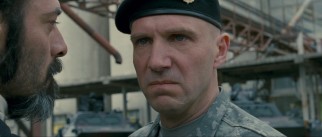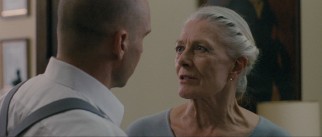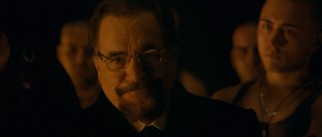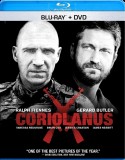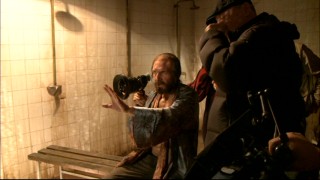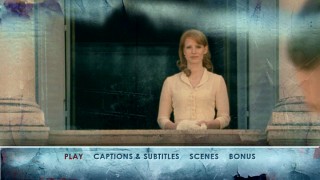Coriolanus Blu-ray + DVD Review
 |
Coriolanus
Theatrical Release: December 2, 2011 / Running Time: 123 Minutes / Rating: R / Songs List Director: Ralph Fiennes / Writers: John Logan (screenplay), William Shakespeare (play) Cast: Ralph Fiennes (Caius Martius Coriolanus), Gerard Butler (Tullus Aufidius), Brian Cox (Senator Menenius), Vanessa Redgrave (Volumnia), Jessica Chastain (Virgilia), John Kani (General Cominius), James Nesbitt (Tribune Sicinius), Paul Jesson (Tribune Brutus), Lubna Azabal (First Citizen - Tamora), Ashraf Barhom (Second Citizen - Cassius), Harry Fenn (Young Martius) |
Buy Coriolanus from Amazon.com: Blu-ray + DVD • DVD • Instant Video
William Shakespeare may be the most celebrated writer in the history of literacy. His plays and poems are as widely read, performed, recited, and dissected as any. His characters and devices permeate culture to the point where you can know his works by references alone. He is fast approaching 1,000 writing credits on the Internet Movie Database and that's not even counting films loosely inspired by him, like The Lion King.
And yet, if Shakespeare was alive today, he'd be 448 years old. When you watch movies from the 1920s and '30s, you are inevitably struck by how language has changed in the past 80 years or so. This approach creates immediate, glaring, and constant problems, especially when the same filmmakers come up with ways to cast the text in a new light. Baz Luhrmann ran into this with William Shakespeare's Romeo + Juliet (1996), which relocated the romantic tragedy to modern times, but he had enough flair and invention to somewhat overcome the ever-stilted exchanges. Michael Almereyda's Hamlet (2000), likewise modernized save for the dialogue, did not and suffered greatly for it.
And now, here is Coriolanus, an unprecedented filming of one of Shakespeare's lesser-known later plays. Actor Ralph Fiennes makes his directorial debut, also producing and starring in the picture. From a script by the accomplished John Logan (whose other 2011 releases included the Oscar winners Hugo and Rango), Fiennes makes Coriolanus a modern morality tale, one involving urban warfare, politics, and cable news.
The film opens with Rome in an emergency state, the product of a food crisis. General Caius Martius Coriolanus (Fiennes) is considered an enemy by the common people, whose crowds are most represented here by two distinct protestors (Lubna Azabal and Ashraf Barhom). Coriolanus is less concerned with public sentiment and more with fighting his sworn enemy, militia leader Tullus Aufidius (Gerard Butler). Meeting in rubble and laying down all their arms for a mano-a-mano knife fight, the two duel and blows are delivered, but none of them fatal.
Coriolanus is decorated for his bravery and prepped for a career in public office, but his consul ambitions are derailed when two traitorous colleagues (James Nessbit and Paul Jesson) turn his easily won over citizens back into vocal detractors. Coriolanus tries to smooth things over in a televised appearance, but the people won't have any of it, calling for his blood and settling for his banishment from Rome.
Separated from his mother (Vanessa Redgrave), wife (the suddenly ubiquitous Jessica Chastain), and son (Harry Fenn), Coriolanus is cast out to isolation in ruins, where a leonine mane supplants his ordinary bald, clean-shaven look. Down but not out, Coriolanus finds the camp of Aufidius and joins his ranks to plot a vengeful siege against the Rome that turned on him.
Coriolanus never overcomes the disconnect between its gritty contemporary visuals and its inflated archaic prose. It is a film at war with itself, its contrast oozing of pretentiousness and standing in the way of our comprehension and attention. There is something insulting about having a cast casually use this often beautiful but extremely unnatural language. They have the benefit of rehearsal and production time to fine-tune the cadences and emphases, while we are left to discern it as it comes. It's like watching a foreign film in a language you don't speak without subtitles; you can probably piece together some of it from the context and inflections, but you're bound to feel you're not getting the full picture.
Though bold, Fiennes' vision for the film is never particularly compelling, with its Fidelius TV broadcasts, tattooed street gang imagery, inconsistent volume levels, camera phones peeking out of crowds, and shaky handheld own photography. It all seems like a desperate attempt to squeeze some relevancy out of a forgotten 400-year-old play. The film floats above the common folk who might be interested in a bloody Fiennes/Butler military action flick in American plainspeak. Yet it falls beneath the arthouse crowd, who might genuinely respect an outside-the-box attempt to film one of Shakespeare's more obscure historical plays.
As an end-of-the-year Weinstein Company release, Coriolanus' measure of success is basically the length of the vertical scrollbar on the film's IMDb awards page. As you can see, that scrollbar is pretty long, meaning that Coriolanus did not pick up much recognition. Further inspection reveals that, as on Texas Killing Fields, most of the accolades it did receive were for being a part of Chastain's banner breakthrough year, one of the most striking and unusual confluences in cinema history. Redgrave won some attention for her supporting role and Fiennes got a few generous first-time director nominations.
However, no honors were worthy of plastering on the front cover of Tuesday's home video debut, the last under Weinstein's distribution deal with Anchor Bay Entertainment. Weinstein's video rights return to Sony Pictures Home Entertainment beginning with next month's release of Best Picture Oscar winner The Artist. That may mean more UltraViolet streams and fewer combo packs, as in recent months, Anchor Bay really warmed to the multi-disc, multi-format option for works far from the family film genre for which they were introduced. Coriolanus is offered as a DVD and the Blu-ray + DVD which we review here.
VIDEO and AUDIO Viewer-unfriendly aesthetics (shaky cam throughout, shots often lacking focus) aside, the Coriolanus Blu-ray still disappoints with its grainy 2.35:1 picture, which is never as sharp or consistent as you'd like. The 5.1 DTS-HD master audio is both better and worse. Better because it delivers a potent experience on a regular basis. Worse because the volume levels are all over the place, with hushed, muttered dialogue requiring you to crank the volume up and then loud, window-rattling steel drum score and gunfire making you turn it way back down. Between the accents, the challenging language and the irritating peaks and valleys, you may frequently consult the English SDH subtitles.
BONUS FEATURES, MENUS, PACKAGING and DESIGN Both the Blu-ray and DVD equip the film with two bonus features. First up is an audio commentary by Ralph Fiennes. He brings the expected passion to a detail-driven, screen-specific discussion The other extra is "The Making of Coriolanus" (5:38, SD), which is about as short as something with that title could be. It gathers remarks from Fiennes and his castmates primarily about his coming to directing from acting. It also adds a few nerdy thoughts from Huntington Library research director Steve Hindle. Each disc opens with menu-inaccessible SD trailers for My Week with Marilyn, The Iron Lady, and The Artist. Coriolanus' own trailer is not included. On both formats, the menu plays sights (under a layer of film) and sounds from the film. The Blu-ray sadly does not support bookmarks or resuming playback. The full-color Blu-ray and plain silver DVD claim opposite sides of a standard Blu-ray case, which is fitted neither with slipcover nor insert.
CLOSING THOUGHTS Ralph Fiennes displays admirable ambition, but modest craft in his modern interpretation of one of Shakespeare's least-known dramas. Coriolanus is a challenging film whose intrigue is swiftly lost in the bold contrast between its words and uninspired visions. The film's Blu-ray displays subpar picture, potent but frustrating sound, and a couple of fitting extras. I do not recommend this to anyone who isn't a Shakespeare buff or familiar with this particular play. Buy Coriolanus from Amazon.com: Blu-ray + DVD / DVD / Instant Video
|
Related Reviews:
DVDizzy.com | DVD and Blu-ray Reviews | New and Upcoming DVD & Blu-ray Schedule | Upcoming Cover Art | Search This Site
DVDizzy.com Top Stories:
William Shakespeare: 10 Things I Hate About You • Gnomeo & Juliet • The Lion King
Ralph Fiennes: Harry Potter and the Deathly Hallows Part 2 • The Miracle Maker • Cemetery Junction
Gerard Butler: The Bounty Hunter • Dear Frankie • The Miracle Match
Jessica Chastain: The Tree of Life • The Help • Take Shelter | Vanessa Redgrave: Miral • Venus • Cars 2
Brian Cox: The Ring • Rushmore • Rise of the Planet of the Apes • Braveheart • Zodiac
Written by John Logan: Hugo • Rango • Sweeney Todd: The Demon Barber of Fleet Street
Plays Turned Films: Vanya on 42nd Street • Doubt • The Ides of March • Jack Goes Boating • For Colored Girls
2011 Weinstein Movies in Blu-ray Combo Packs: The Iron Lady • My Week with Marilyn • W./E.
Coriolanus Songs List (in order of use): Goran Bregovi? - "Cajesukarije", Sheer. K - "Fiction", Lisa Zane - "Sta Pervolia"
Text copyright 2012 DVDizzy.com. Images copyright 2011 The Weinstein Company, Hermetof Pictures, Magna Films, Icon Entertainment, BBC Films,
and 2012 The Weinstein Company Home Entertainment and Anchor Bay Entertainment. Unauthorized reproduction prohibited.
